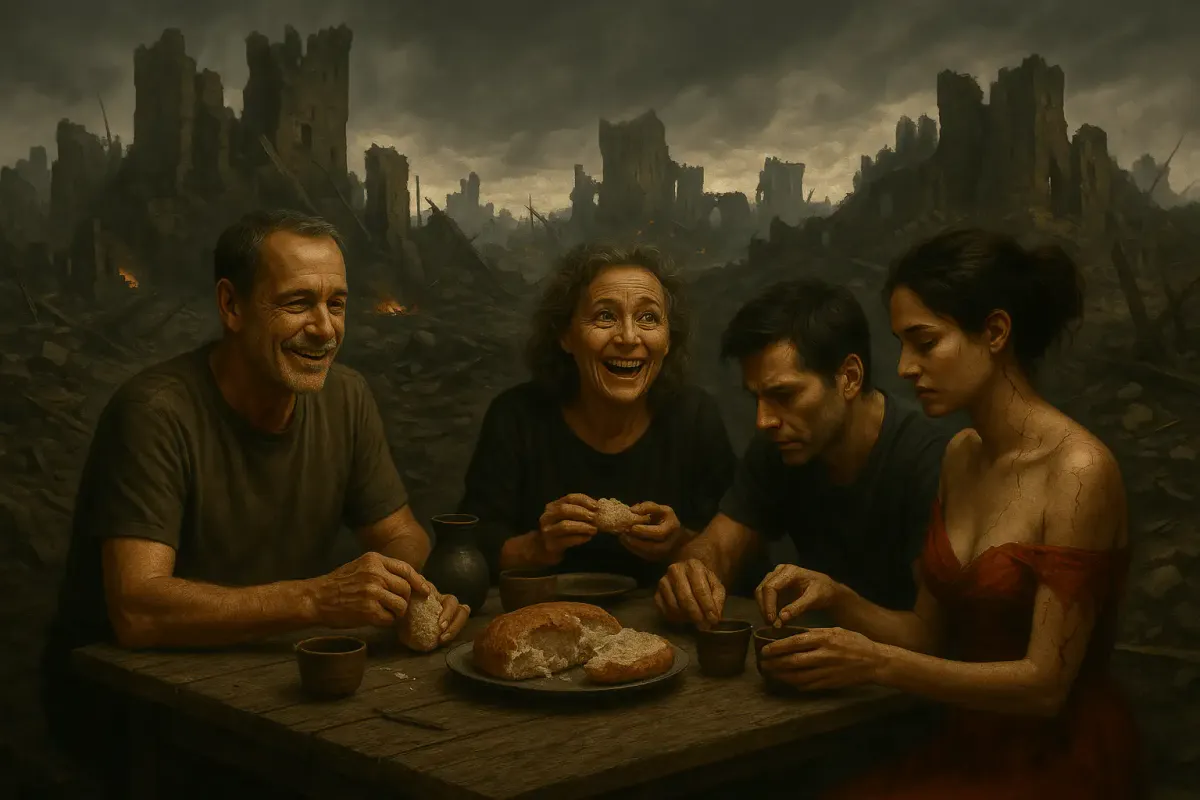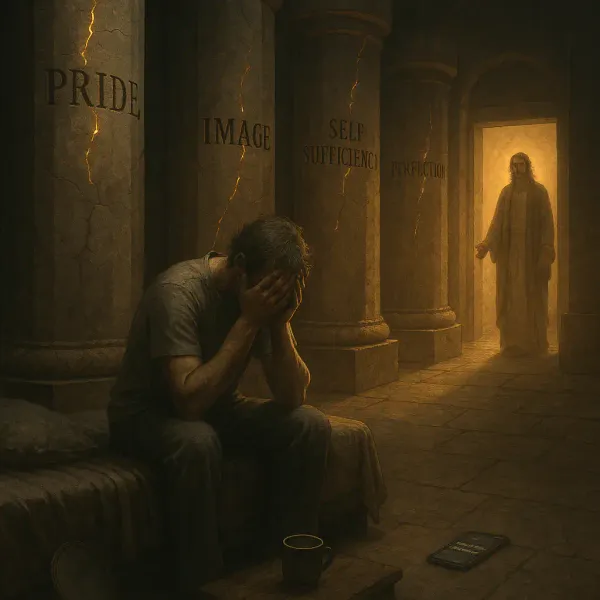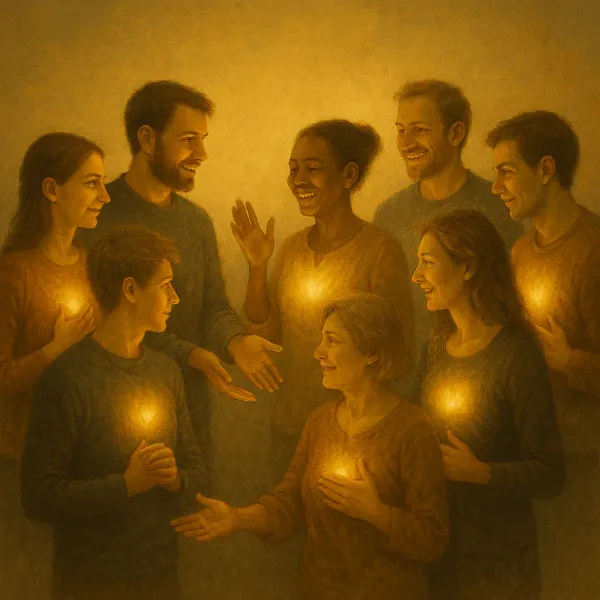Remaining Human in a Fraying, Unravelling Age
In a world fraying from within and unravelling from above, this is a call to remain truly human. As trust erodes and AI simulates presence, the Church must remember who she is—anchored in Christ, slow to speak, steadfast in love, and faithful in a culture that rewards division over endurance.

When Knowing Itself Is Rewritten
We are living through more than a technological shift. What we face is not a faster version of what has been, but a redefinition of how knowing, discerning, and becoming are even possible. This is cognitive migration — not just in individuals, but in the soul of our societies.
Artificial intelligence no longer merely automates. It competes. It interprets. It performs the acts once exclusive to humans.
The Centre Begins in Us
Before the centre cracks in culture, it fractures in persons.
The split began long before the algorithm. It began with the lie that we could be like God — unlimited, self-made, self-sustaining. That lie wears different masks now.
Men, shaped to bear weight, overstate their strength. They posture competence, perform certainty, and cloak their limits in language of leadership. They are rewarded for control — but rarely for confession.
Women, shaped to carry care, overextend their reach. They take on the emotions, burdens, and wounds of others as proof of worth. They are praised for holding it all together — even as they are quietly unravelled.
Each presumes too much in their pride. Each becomes untethered from presence. And presence, once lost, is hard to recover. Especially when performance is still applauded. This is not about masculinity or femininity — it is about what happens when grace is replaced by performance, and image-bearing by self-making.
Jordan Peterson asks the piercing question: “How much do we suffer because suffering is inevitable, given the limits of our mortal frames — and how much because we presume too much in our pride?”
The algorithm did not invent this. It amplifies it. It codifies our overreach and sells it back to us as virtue. And we buy it — because it flatters the version of ourselves we wish were true.
The tragedy is not the machine. It is that we’ve forgotten how to be human because of our deep pride.
Cracks in the Centre
Institutions strain under the pressure.
Churches drift.
Trust fractures.
The assumption that humans are the apex of discernment dissolves into a new order — one fed by optimisation, driven by feedback, and curated by algorithm. Men overstate their capacity. Women overextend theirs. Each drawn into performative certainties, distracted from presence.
This isn’t just institutional fatigue — it’s personal disillusionment.
People feel it in the slow bleed of trust.
In churches that teach but don’t shepherd.
In schools that credential but don’t form.
In leaders that pontificate and post but don’t listen or act.
Institutions no longer carry meaning — they chase metrics. They respond, but they don’t anchor. They transact, but they don’t hold.
It’s not just that things aren’t working. It’s that we no longer believe in them. We’ve lost our trust in them. Something deeper has come unstitched.
Where the centre cracks most:
- The church being a content platform, not a united family.
- The university a credential factory, not a formation space.
- The government a reactive processor, not a steward of the good.
- The hospital a billing machine, not a healing place.
- The media an attention broker, not a witness to truth.
Each fracture is spiritual. Each reveals what happens when the pride of man replaces the presence of Christ. When institutions reflect the logic of optimisation more than the mind of Christ, they lose not just trust — they lose their soul.
A Crisis Now Inside the Room
But this is not simply a structural crisis. It is a crisis of centre. The metaphysical heart — the Logos, Jesus, the Person through whom all things hold together — is being algorithmically replaced by a centre-less swarm of endless stimuli.
Truth becomes probabilistic.
Conviction becomes a signal.
What is left is noise.
This dislocation is not merely external. It is internal. We feel it in our attention, our prayer, our exhaustion. In the quiet hollowness of digital life — the endless noise is in the room — our room, our feed.
Exhausted, mentally and physically.
Regularly anxious.
Haunted by the ache of never quite measuring up.
Of being always behind.
FOMO.
Scattered.
It is not only in the world. It is now in the church — and even in the local body. The crisis of love is no longer hypothetical. It is among us.
The Church Must Remember Who She Is
And yet — the Word still speaks. And the Church must remember who she is.
Not abstractly.
Not institutionally.
Locally. Practically.
Through broken people who still choose to love. In living rooms and prayer circles. In WhatsApp threads and half-heard apologies. In shared tables where disagreement has not yet broken fellowship.
Romans 14: A Counter-Culture of Restraint
Romans 14 is a radical invitation to choose restraint over reaction, presence over position. It speaks not to the powerful, but to the peacemakers.
“Accept the one whose faith is weak… without quarrelling over disputable matters.” (v1)
“Let us therefore make every effort to do what leads to peace and to mutual edification.” (v19)
In a culture fuelled by outrage, performance, and algorithmic engagement, Paul offers a different witness.
Not passivity. But cruciform strength — the kind that bears with the one who is different, without needing to dominate or distance.
Even if someone is technically right, if their correctness wounds another or divides the body, they are not acting in love (v15). Paul calls this out directly: peace is not compromise, it is maturity. It is costly. It restrains self-expression for the sake of deeper communion.
Romans 14 dismantles the purity reflex. It reframes maturity as how well we love the less mature, not how sharply we discern nuance. It dares to say: faithfulness is not measured by certainty, but by restraint. Not how loudly we defend the truth, but how gently we treat those struggling to grasp it.
This is profoundly anti-algorithmic. While the digital logic of our age rewards certainty, signal, and division, the apostolic call is to unity that costs, kindness that endures, and truth held humbly — a love that suffers long.
To those eager to draw lines, Paul draws a circle. To those ready to separate, he asks: “Christ has accepted them — who are you to reject?” (v3)
Peace and unity are not the absence of conflict, but the presence of restraint for the sake of love. It is the higher law.
The Local Body in the Age of the Algorithm
In this moment of institutional collapse — where engagement algorithms deepen divides and AI hollows out the craft of wisdom and discernment — the local church is where we must relearn the faithful, steady slowness of love.
Romans 14 dares to say: No.
No to your need to win.
No to your demand for certainty.
No to your preference masquerading as purity.
Your faithfulness is not proven by how right you are, but by how you bear with the one who is not.
This is not passivity. This is priesthood.
Institutions Will Shake — Christ Will Not
The institutional church, too, faces a profound reckoning. It has often trusted in frameworks designed for previous eras—bureaucracies, platforms, and brands—to sustain life and mission. But as algorithms increasingly automate sermons, replace shepherding with data, and trade embodied fellowship for digital presence, we must confront a crucial truth: the body of Christ was never meant to thrive on convenience or efficiency.
Our resilience is not in structure or strategy, but in the incarnate presence of Christ—expressed through shared lives, messy tables, and patient endurance with one another in real, tangible community.
The Church is not collapsing because Christ is not — He's building HIS church.
But the church institutions may.
The personality led platforms may.
The influencer may.
What remains will be those who refused to leave the table, even when it got messy. Those who wept in prayer, endured in sacrificial love, rather than opined in posts.
Maturity That Cannot Be Automated
Spiritual maturity is slow. It does not go viral. It forms in the interruptions. In the tension. In the pauses between offence and response — the moments where love chooses not to walk away.
We do not mirror the spirit of the age.
We do not outsource discernment.
We do not build our communities on clarity alone.
We pursue peace — not because it is safe, but because it is the mark of the saints at the end of the age.
Remaining: The Practice of Being Known
“In your patience, possess your souls.” (Luke 21:19. NKJV) — or as so well articulated in the AMPC version: “By your steadfastness and patient endurance you shall win the true life of your souls.”
So we remain. With the weaker. With the difficult. With the ones who still don’t understand. With the ones who misunderstand us.
We remain. Because He remains.
And we are not content to be correct. We long to be known.
Fully. In Him.



